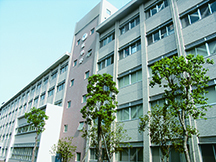
We offer all the fields of medicine, nutrition, nursing and health care necessary for holistic healthcare
We aim to train students who can contribute to society through education, research, and medical treatment related to medicine, nutrition, and welfare.
- The School of Medicine trains students to have basic clinical ability and medical research capabilities, who can contribute to society through medical, educational, health and welfare activities throughout their lives, and contribute to the development of medicine.
- The School of Nutrition, based on the philosophy that nutrition is the foundation of life, undertakes medicine-based medical nutrition research, and trains students who can contribute to sophisticated medical treatment and the maintenance and promotion of health through medical nutrition.
- The School of Health Sciences supports advanced, specialist medical care based on humanity, science and cosmopolitanism, training students who can respond to diversified needs in health, medical care and welfare, and contribute to the development of health sciences.
The Faculty of Medicine comprises the School of Medicine, the School of Medical Nutrition, and the School of Health Sciences. The School of medicine has been established in 1943 and The School of Medical Nutrition has been established in1964. The School of Medicine, comprising 11 courses which are composed of 54 departments that integrate basic and clinical sciences, fosters physi-cians and medical researchers who will contribute to the development of medical science and practice. The school of Medical Nutrition is the only one of its kind among the national universi-ties in this country for being incorporation with the faculty of medicine. It comprises two courses covering eight fields of nutritional science and aims at fostering Registered Dietitian Nutritionist as well as educators and researchers in nutritional sciences who will contribute to the public health and disease prevention and treatment. The School of Health Sciences has been established in October 2001, fosters nurses, radiological technologists and medical technologists with specialized knowledge and skills, as well as educators and researchers in medical technol-ogy. The course of study is six years for the School of Medicine, and four years for the School of Medical Nutrition and the School of health Sciences.
School of Medicine
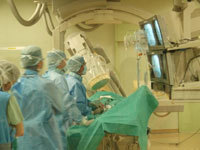
Clinical Clerkship
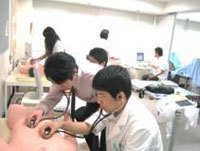
Clinical training room
(Clinical Skills Laboratory)
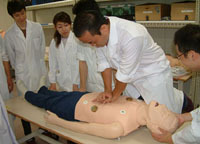
Objective Structured
Clinical Examination(OSCE)
Tokushima Prefectural Medical College was established in 1943 supported by the earnest desire of the community for medical doctors in the island of Shikoku. In accordance with extensive reforms of the Japanese educational system after World War II , the College was incorporated into the newly established University of Tokushima School of Medicine in 1979.
Since then, the School has been developing steadily to provide excellence and leadership in medical education, research and service. The School was the only medical school in Shikoku until 1973.
The School of Medicine admits 112 undergraduate students annually and offers a six-year education program leading to the degree of Bachelor of Medicine. The curriculum covers a wide area of basic and clinical medicine in addition to the university-wide programs of general education. The School is closely linked to our principal teaching hospital, Tokushima University Hospital, which is the largest hospital (692 beds) in Tokushima, equipped with modern facilities for diagnosis and treatment.
School of Medical Nutrition
In view of the importance of nutrition in promoting health, the former Japanese Ministry of Education and Ministry of Health decided to establish a center for education and research in nutrition science in the national university system. Tokushima University was chosen to be the site of the new School of Nutrition in 1964. Since then, the School has trained many leading nutrition scientists as well as practicing nutritionists. The School is now recognized as the leading institution in nutritional science in Japan.
The School of Nutrition admits 50 undergraduate students annually and offers a four-year education program leading to the degree of Bachelor of Science in Nutrition. In 2014, the School of Nutrition reached the 50th anniversary from the foundation. We also reorganized it from "the School of Nutrition" to "the School of Medical Nutrition". We would like to grow up nutritional scientists or clinical dietician on the issues based on medical field. Then, the School set up a new department, named "Department of Nutritional Therapy".
Now the School has eight departments with specialties ranging from molecular nutrition to clinical and public health nutrition. Students receive training in clinical nutrition in association with the University Hospital.
School of Health Sciences
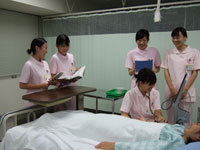
Nursing students practicing basic
procedures in nursing arts
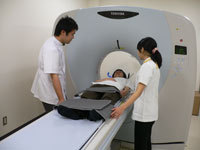
Students tarining for CT
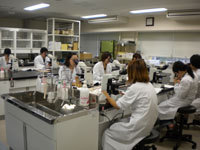
Students examining human tissues
with microscopes
On October 1, 2001, the Junior College of School of Medical Sciences was incorporated into the Faculty of Medicine. The School of Health Sciences aims to train future staff who can support advanced and specialized medical treatment, according to the needs of national health, medical care and welfare. The School of Health Sciences, comprising three majors in Nursing, Radiologic Science, and Laboratory Science, admits 124 undergraduate students annually and offers a four-year education program leading to the degree of Bachelor of Nursing or Health Science.
The Major in Nursing includes departments of Fundamental Nursing, Adult & Gerontological Nursing, Maternal & Pediatric Nursing, and Community & Psychiatric Nursing. The Major in Radiologic Science has departments of Radiologic Science & Engineering and Radiologic Technology. The Major in Laboratory Science has departments of Functional Laboratory Science and Morphological Laboratory Science. The School provides basic and clinical courses in each specialty in addition to university-wide programs of general education.

